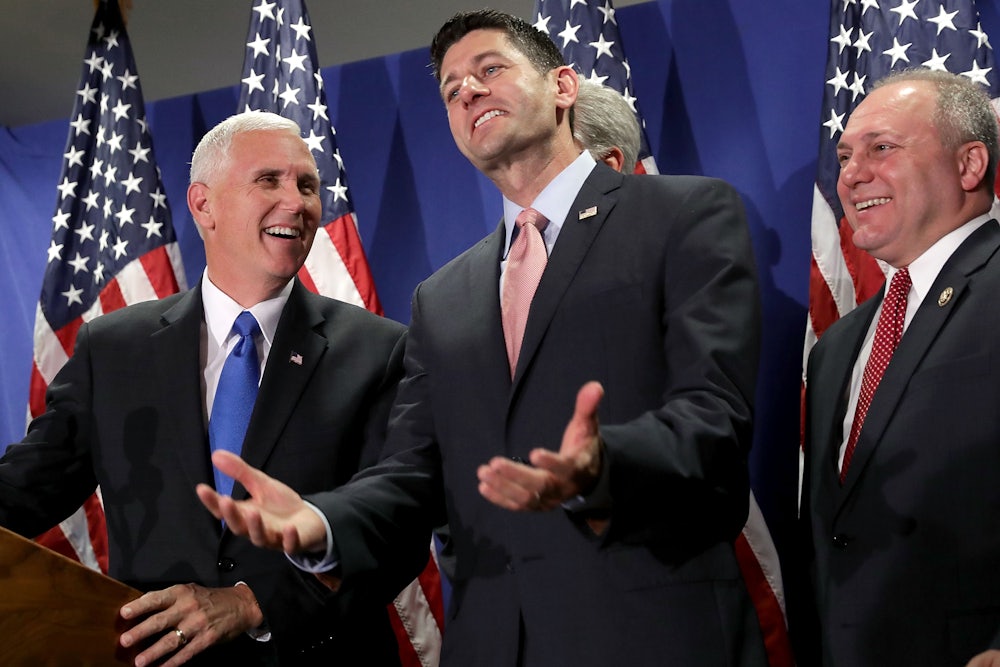The first Republican health care bill failed last month because it was too cruel for all Democrats and many Republicans, while insufficiently Randian for the most conservative members of the House of Representatives. Reviving the effort would thus require either a shift to the left significant enough to win over some Democrats, or lunging right and hoping that Republicans in moderate districts could be bullied into voting for whatever ultimately reaches the House floor.
The latest reports out of Capitol Hill suggest Republicans are contemplating the second option. The plan they are devising is so much more vicious than the failed American Health Care Act that—if it somehow passes the House and Senate, and President Donald Trump signs it into law—it will amount to a unified Republican statement that sick people deserve to fend for themselves, just as they did before the Affordable Care Act came to their rescue.
The linchpin of the plan—the key concession from GOP leaders that is likely to satisfy conservative House Freedom Caucus members—would allow states to waive not just the ten essential benefits that are required by the ACA, but its central risk-pooling provision, which prohibits insurance companies from charging sick customers more than healthy customers. It would, in other words, end the blanket federal ban on discrimination against individuals with pre-existing conditions, and, in some states, drive those people out of insurance markets altogether.
This would violate a central promise Trump made on the campaign trail, and the first principle he laid out to Congress in his February joint address—that “we should ensure that Americans with pre-existing conditions have access to coverage.” It would also violate a promise congressional Republicans made when they unveiled the American Health Care Act, that their bill would not repeal “patient protections, including for people with pre-existing conditions.”

In defending this new compromise, Republicans likely will deny that they are undermining protections for Americans with preexisting conditions. Freedom Caucus Leader Mark Meadows equivocated on precisely this point, as quoted by Huffington Post reporter Matt Fuller:
Meadows said Monday night that the pre-existing conditions protections would remain in the new form of the health care bill, but when pressed on whether gutting the community rating provisions would allow insurers to charge people with pre-existing conditions more, he acknowledged that some sick people may be picking up the slack so that premiums of the healthy would go down.
“The fundamental idea is that marginally sick people would pay the risk associated with their coverage,” Meadows said. “Those that have premiums that would be driven up because of catastrophic illness or long-term illness, we’ve been dealing with that for a long time with high-risk pools.”
Meadows is clinging to imaginary reeds. The Affordable Care Act guarantees coverage by simultaneously prohibiting insurers from rejecting sick customers outright and requiring them to charge all customers (within certain age ranges) the same premiums for the same policies. Waiving the rating provision, but not the coverage guarantee for people with pre-existing conditions, would make the latter functionally useless. Under the new GOP framework, insurers in states that waived community rating couldn’t tell sick customers to take a hike, but they could jack up premiums enough to make insurance plans for these customers unaffordable or useless.
Allowing health plans to price-discriminate like this would, of course, require them to identify sick people in the first place, which would presumably entail a return to underwriting and practices similar to rescission (the right to cancel plans retroactively, which the ACA banned). Those already insured would thus face huge premium increases when they become sick, or if they have used too much insurance already. Those who are uninsured would have to disclose their medical histories to insurance companies before being given premium and deductible quotes.
It is possible, of course, that few states will seek a community rating waiver, in which case its existence would prove to be largely symbolic: Republicans could claim a victory for states’ rights, while also deflecting conservative donor-class ire away from Congress and toward those very states.
But the AHCA was a dead letter in the Senate before this proposed change; making the bill more extreme would render it even more toxic in the upper chamber. That’s why its resurrection, and the concomitant horse-trading, should be read first as an effort to reroute right-wing outrage, which is currently directed at the House Republicans, toward the Senate.
When Senate Majority Leader Mitch McConnell discusses the AHCA now, he mischievously notes that the process fell apart in the lower chamber. “It’s pretty obvious we were not able in the House to pass a replacement,” he told reporters recently. House Speaker Paul Ryan’s failure was McConnell’s salvation. The last thing Senate GOP leaders want is for House Republicans to glue their hideously unpopular health care bill back together with the blood of the chronically ill and leave the fate of Obamacare in McConnell’s hands.
But this is the plan kicking around House Republican circles today. If they agree upon it, they will circumvent the regular order again, allowing them to move faster than public awareness, and pass it before the backlash begins. Last time, the Republicans tried to pass comprehensive health care reform in 18 days; this time, they will give it three or four. But the bottom line is quite plain: Republicans in Congress want to return to the pre-Obamacare status quo in as many states as possible, while snow-jobbing sick people about what the consequences will be for them.
